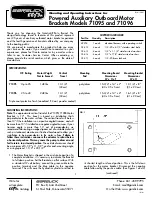
UNI-T
UPO 3000E&UPO2000E Series Oscilloscope Programming Manual
Set return format of waveform AD data. This command is only valid for AD data.
BYTE
:
return 8 bits value, single byte binary data
WORD
:
return 16 bits valule, short type binary data
ASCII
:
return waveform AD data character string, single AD value turn to ASCII character string,
each data point separated by comma mark. In addition, it is conform to binary data IEEE488.2
format, for example #41234120,125,128..........\n.
CSV
:
return waveform AD data set of CSV file format <filed separated by comma mark, line
separated by\n >, single AD value turn to ASCII character string.
DAT
:
set return waveform data by built-in data format
For example
:
single point of AD value is 120
BYTE
:
return 0x78
WORD
:
return two bytes 0x78 and 0x00,
(
little end format
)
ASCII
:
return '120' of ASCII character string
CSV
:
return '120' of ASCII character string by CSV standard format
Return format:
Query return { WORD |
BYTE |
ASCII }.
For example:
:WAVeform:FORMat BYTE
return format of waveform data is single byte mode
:WAVeform:FORMat?
query return BYTE
:WAVeform:VOLtage:FORMat
Command format:
:WAVeform:VOLtage:FORMat { BYTE |
ASCII | CSV }
:WAVeform:VOLtage:FORMat?
Functional description:
Set return format of waveform point voltage data, this command is only valid for voltage data,
unit is the current channel unit.
BYTE
:
return float type binary data
ASCII
:
return waveform voltage data character string, single voltage value turn to ASCII character
string, each data separated by comma mark and it’s conform to binary data IEEE488.2 format. For
example#412342.0, 2.1, 2.3.............\n.
CSV
:
return waveform AD data set of CSV file format <file separated by comma mark, line
separated by\n >, single voltage value turn to ASCII character string
For example
:
voltage value of single point is 2.0V
BYTE
:
return 0x40
、
0x00
、
0x00
、
0x00
ASCII
:
return '2.0' of ASCII character string
CSV
:
return '2.0' of ASCII character string by
CSV standard format
Return format:
Query return{ BYTE |
ASCII | CSV }
For example:
















































